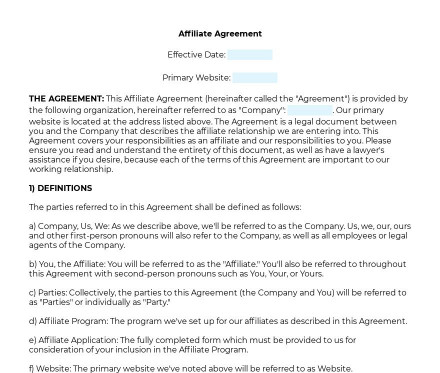Affiliate Agreement Free
When two parties (the company and the affiliate) form a relationship whereby the affiliate receives funds for particular qualified actions, they can use an Affiliate Agreement.


 Template Overview
Template Overview
When two parties (the company and the affiliate) form a relationship whereby the affiliate receives funds for particular qualified actions, they can use this Affiliate Agreement. Online affiliate agreements can take one of two forms: affiliate agreements whereby the affiliate receives funds for user clicks through to the company's website or affiliate agreements whereby the affiliate receives funds for user purchases for the company's goods or services.
As many individuals working online can make significant income from affiliate relationships, Affiliate Agreements are getting more popular.
Many users on prominent social media platforms contract with companies to promote products or services. When the company receives clicks or purchases from the affiliate's individualized links, the affiliate then gets a set amount or a percentage of the sale or a set amount per click.
In these types of agreements, the affiliate most often does not get a say in the specific terms. The affiliate simply signs up for the program that the company is offering, and there is no bargaining over the agreement.
You fill out a form. The document is created before your eyes as you respond to the questions.
At the end, you receive it in Word and PDF formats. You can modify it and reuse it.
 How to use this template
How to use this template
A company looking to create a comprehensive agreement for new affiliates should use this document. Here, the person filing the document is able to enter identifying details of the company, such as the name and website. Also, he can describe the details of the affiliate relationship, such as what type of affiliate program this is and the specific payout terms.
There will also be general contract provisions included, which cover the state location for any disputes, as well as other general terms.
A completed document should be posted online on the company website.
 Applicable law
Applicable law
In the US, both Federal and specific-state laws govern Affiliate Agreements. They cover general contract principals, such as formation and mutual understanding. The Federal Trade Commission, or FTC, in the United States, oversees affiliate disclosures.
Ready to build your document from this template?


 Please wait
Please wait
